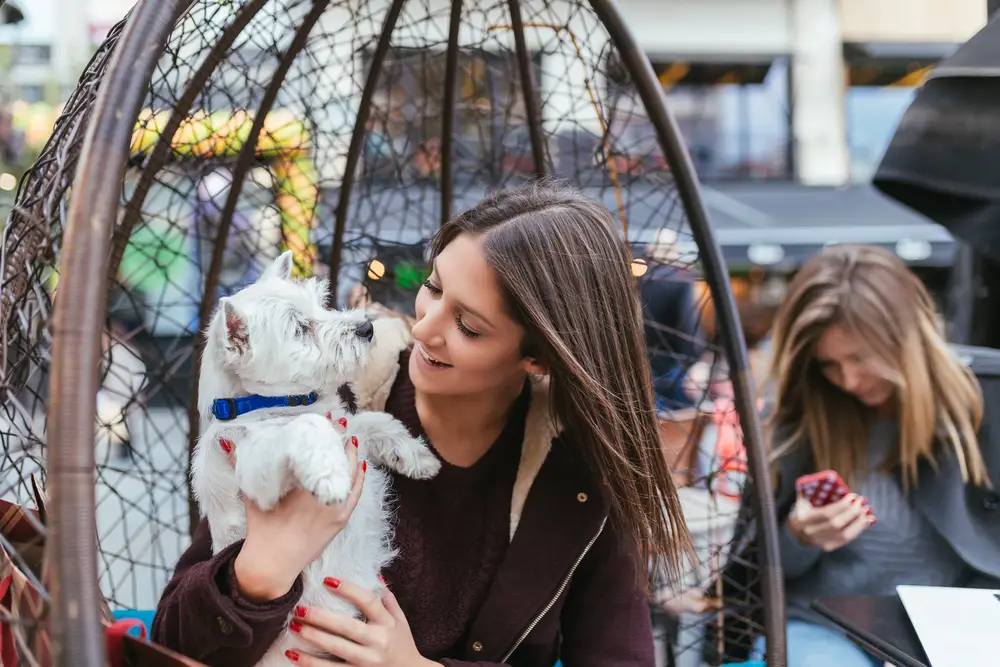
West Highland White Terriers or Westies seem made for laps. Adults only grow anywhere from thirteen to 22 pounds, with males usually being larger and heavier than females.
Westies make good lap dogs – depending on the dog and the person providing the lap. Each dog has his or her own personality and so some love laps while others do not.
The West Highland White Terrier Club of America notes that some Westies are too “independent” to be lap dogs. This means the dogs get uncomfortable on laps or even being hugged.
Do Females Make Better Lap Dogs Than Males?
Since females are usually smaller and lighter, they are often more comfortable to place on laps than males. Westie owners are split as to whether females make better lap dogs than males.
No studies exist as to whether females are more lap-friendly than males. The West Highland White Terrier Club of America states that males are as equally lap-friendly as females.
The Half-Lap Dog
Many small dogs like Westies love to drape the front part of their bodies over laps and then stretch out on the bed or couch next to the keeper of the lap. They sometimes just rest their heads and fore legs on the lap.
Puppies that used to crawl entirely onto a lap may change behavior into a more sprawled posture as they age. Again, it all depends on the individual dog’s character as to how he or she behaves on a lap.
Why Westies Like to Cuddle
Most Westies enjoy being in some sort of physical contact with their human as they rest. They may not like laps but may love curling next to a person or even resting a furry head on favored feet.
This harkens back to the time when puppies got to curl up with their littermates and their mom for comfort and security. Puppyhood is often the happiest time of a dog’s life and so they often do anything that makes them feel, however briefly, that they are as safe and secure as when with Mom and siblings.
Dogs Will Be Dogs
Keep in mind that all dogs like to get dirty, roll around in unidentifiable organic matter and then jump on your lap. Try not to get too upset when this happens; just gently remove the dog, stand up and get cleaned up.
Never hit a Westie for jumping on a lap when dirty or wet. After all, the dog had been encouraged to jump on laps and does not know any better.
A Note About the Sick or Elderly
Dogs make great companions for the convalescent, the ill or elderly people. However, younger dogs may not be appropriate lap dogs, but can rest beside a person.
Younger and ore active dogs spring to life at a moment’s notice, such as when the doorbell rings. They can use the human abdomen to propel their bodies and this can be very painful for a frail person.
What About the Furniture?
It is unrealistic to expect a Westie to be a lap dog and not get on the furniture. Before bringing a Westie home, decide whether the dog is going to be allowed on the furniture.
Once this is decided, all members of the household need to follow it. If the kids allow the Westie on the furniture but the parents do not, there is going to be one confused dog.
A Note About Westies Being Woken Up From A Deep Sleep
Some Wesites are grumpier than others. However, just as people do not like being woken up from a deep sleep, so too do Westies not like being woken up and asked to leave a nice warm lap, like Cotton in this YouTube video.
Westies may often growl, grumble or do other vocalizations to express their disapproval and sometimes their disorientation. Do not worry about these noises – they do not mean the Westie is going to bite.
The Older Westie
Older Westies often develop arthritis or other problems which make them not able to jump as high and as accurately as when they were younger. These Westies need vet care and they need a little help getting to the couch or the lap.
Doggy steps are a popular way to help a Westie help himself up onto the couch or the lap. This also helps owners that may have arthritis and cannot bend over to pick up their Westies.
In Conclusion
Before you bring a Westie home, it’s reasonable to wonder if Westies make good lap dogs and puppies? They can be, depending on the individual dog’s character.
Many Westies prefer draping the front part of themselves over their humans and others like to stay against the side. Older Westies need help getting up onto a lap or couch. Feel free to comment or ask any questions below.